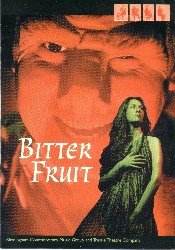 S&H Music Theatre Review
S&H Music Theatre Review
 S&H Music Theatre Review
S&H Music Theatre Review
John WOOLRICH Bitter Fruit Trestle Theatre
Company/Toby Wilsher & Russell Dean, with Birmingham Contemporary Music
Group/Pierre-André Valade. Queen Elizabeth Hall, 1 December 2000
(PGW)
The first year in the new millennium will not have yielded a more significant music theatre event than this wordless play within a play, created for the 'theatre of masks' Trestle Theatre Company, whose previous productions in Edinburgh & London have left me with a succession of indelible images and memories. Toby Wilsher [photo right] calls Bitter Fruit a silent opera. John Woolrich [photo right]felt liberated not to have a text. Their collaboration circumvented the frequent operatic disjunction of libretto and music jarring with the theatrical production. Woolrich wrote 'a huge piece of music' on the theme of Vulcan, the limping god who invented fire and, as the scenic realisation developed, Woolrich completed his full length score, conceived to have a strong life of its own, and to be susceptible to other re-interpretations.
The story, derived from an ancient Greek myth, involves magic and unrestrained violence, a disabled, exiled son returning to wreak vengeance on his wicked parents, an automaton handmaiden who is turned into a killing machine, the protagonist finally realising he has been cuckolded and humiliated setting fire to the baronial castle - all perish. This is enacted with a density of bodily gesture which demands to be seen more than once to take in its complexity and truthfulness, a virtuoso demonstration based upon the observation of how high a proportion of communication is through body language.
Woolrich is master of the pared down aphoristic statement, his pieces often brief and elliptical, with a disconcerting paucity of notes on the page. His delightful Piano Books, premiered at the Hoxton New Music Festival which he curates (a spin-off from the Almeida Opera Festival) have been published recently by Faber Music and offer a good way into his musical thinking.
Bitter Fruit demonstrates the same characteristics, and its authorship is instantly recognisable from the beginning, but its initial understatement proves illusory as the drama of the play-within-a-play develops towards its dreadful conclusion, with a stage full of corpses as in a Restoration Tragedy, and a final conflagration matched by dramatic music with its own powerful momentum.
The BCMG gave it full conviction under Pierre-André Valade, who has made the transition from leading contemporary music flautist to full-time conductor, especially of contemporary music. This is indeed a big score and one that would repay listening to alone; a CD of this authoritative realisation is to be hoped for. Before reaching the QEH, Bitter Fruit had been seen at seven venues during November (including, before our arrival there, the Huddersfield Festival - where we never even heard it talked about!).
The ingenious staging, designed for dismantling and reassembling for one-night stands, would lend itself well to photographing; what chance of a DVD of this auspicious premiere production of one of John Woolrich's most important scores?
Peter Grahame Woolf
(See Trestle's website at www.trestle.dircon.co.uk and BCMG's at www.bcmg.org.uk )
Seen&Heard is part of Music on the Web(UK) Webmaster: Len Mullenger Len@musicweb-international.com
Return to: Seen&Heard Index
 Return to:
Music on the Web
Return to:
Music on the Web